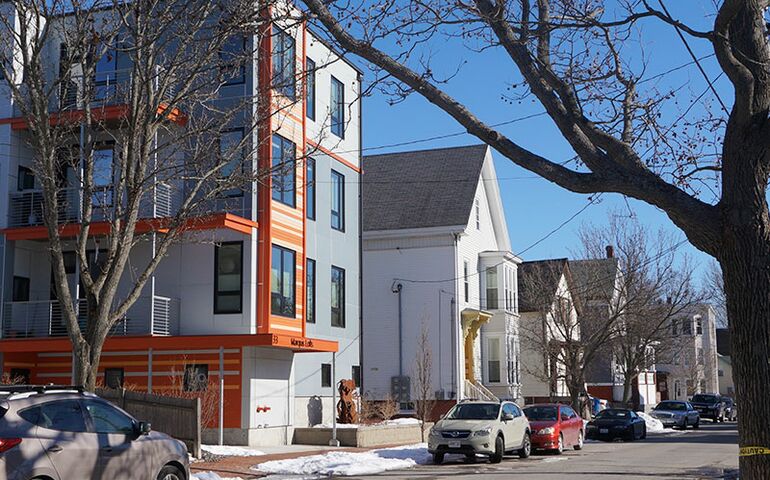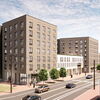Processing Your Payment
Please do not leave this page until complete. This can take a few moments.
- News
-
Editions
View Digital Editions
Biweekly Issues
- December 15, 2025
- December 1, 2025
- Nov. 17, 2025
- November 03, 2025
- October 20, 2025
- October 6, 2025
- + More
Special Editions
- Lists
- Viewpoints
-
Our Events
Event Info
Award Honorees
- Calendar
- Biz Marketplace
In turnaround, Portland City Council approves Munjoy Hill Historic District
 Photo / Maureen Milliken
The Portland City Council Monday night approved a historic district for Munjoy Hill, a reversal of the council's Feb. 1 vote not to approve the district, which has been in the works for three years.
Photo / Maureen Milliken
The Portland City Council Monday night approved a historic district for Munjoy Hill, a reversal of the council's Feb. 1 vote not to approve the district, which has been in the works for three years.
The Portland City Council approved the Munjoy Hill Historic District Monday night in a turnaround of February's vote against it, a move that brings with it an in-depth look at the impact of historic districts as a whole how they're created.
The vote was a result of a reconsideration request by Councilor Andrew Zarro, of District 4, who voted against the district Feb. 1, but asked three weeks after the vote that the council take another look. His vote was the difference in Monday night's 5-4 approval.
Zarro said that other moves the city is making, including a study on the impact of its 12 historic districts, are a big step forward. "Portland will be one of the first cities to modernize historic preservation and what it means" to residents and the city as a whole, he said.
The Munjoy Hill Historic District is the city's 12th, and includes 376 contributing properties — ones that meet the criteria for age and retained historic features — representing 88% of the property in the 64-acre district. It's part of the 162-acre neighborhood at the eastern end of the Portland peninsula. Overall, the district comprises 49% of of Munjoy Hill’s building stock.
Arguments since 2018 on both sides of the issue — from the council, the planning board and city residents — cited lack of affordable housing in the city, growing gentrification of the neighborhood and policies and development trends that stymie diversity and equity.
The Feb. 1 meeting that resulted in the district being voted down centered around issues of affordable housing and equity. But Monday's meeting was more about the raw emotions the reconsideration inflamed, including attacks on the integrity of District 1 Councilor Belinda Ray, who represents Munjoy Hill, and people confronting employees in the restaurant Zarro owns.
Zarro, who was elected in November, said his call to reconsider the district wasn't intended to inflame the controversy, but as a new councilor he wanted to have time to digest the information. "It's become profoundly clear that we should be talking about peoples' right to property, not just property rights," he said.
His vote to approve Monday came after the council earlier in the meeting approved a study that will look at the impact of the city's historic districts on residents and the city as a whole. The analysis results will guide future actions by both the city's planning staff and the city council, and will be completed at the direction of the city manager.
The city also agreed to look into establishing an equity fund, or something similar, for residents in historic districts who can't afford to make housing improvements that meet district standards. The city will also look at how it traditionally approaches historic districts in the ongoing recode effort.
"There's far more work to do," Zarro said, particularly around affordability and how historic districts contribute to the volatility of the housing market.
Voting in favor were Zarro; Ray; Mayor Kate Snyder; Spencer Thibodeau, District 2; and Mark Dion, District 5. Opposed were Pious Ali, at-large; April Fournier, at-large; Nicholas Mavodones, District 2; Tae Chong, District 3.
Opposition cites property rights, affordability
Fournier and Chong reiterated their opposition to the district Monday.
"I fundamentally don't believe in a blanket historic district," Fournier said. "I don't believe that a board of volunteers has the right to tell people what to do with their property." Property owners of contributing structures in the district will have to get approval from the city before making any improvements or alterations that can be seen from a public way.
Fournier also said a neighborhood's history isn't represented by one moment in time, but by how it evolves.
Chong said he is more against the district now than he was when he voted against it in February. The discussion then, he said, was about affordability and keeping buildings from being torn down. Since then, it's become about sense of place and preserving the neighborhood.
"It's really about who gets to live here," he said, adding that rents have skyrocketed from the $1,500 for a one-bedroom that was cited when the process first began in 2018, and the neighborhood is even less affordable. "This is a NIMBY argument, rather than a historic district argument," he said.
To people who say "Munjoy Hill isn't what it used to be," Chong said, "That transformation happened 30 years ago."
'Incredibly trying days'
The focus of much of the discussion Monday was about the public reaction to the council's agreement to reconsider, which included attacks on Ray, both on social media and emails to councilors, as well as people confronting Zarro's employees in his restaurant.
"We all live in this city, and any issue we vote on, all of us are impacted," Thibodeau said. He said while the nine councilors may disagree on issues, what they agree on is that no member of the board should be attacked for their character, or be the target of a misinformation campaign.
Snyder said the two were doing their jobs as councilors — Zarro had the right to ask for reconsideration, and Ray has always been up front and transparent. She and others on the board stressed that Ray's current employment with a developer was not a conflict of interest, or even a perceived one, according to the city's corporate counsel.
Of particular concern, Snyder and others said, was an email to councilors and widely circulated social media posts from a Portland resident who now lives in San Francisco that had misinformation and person attacks on Ray.
Both councilors have stepped up to public service, something that requires a big commitment, Snyder said. But the current atmosphere doesn't respect that. "These can be incredibly trying days as far as the heat being turned up," she said.
Before the vote, the council discussed a handful of amendments introduced by Ali representing homeowners who didn't want their property to be part of the district.
The amendments were all rejected, 8-1, with Ali voting in favor, after city staff said that the process for homeowners who wanted to appeal was to go before the Historic Preservation Commission.
The historic district was approved by the Historic Preservation Commission in November 2019 and by the Planning Board in August, in a 4-3 vote where members had many of the came concerns the council has expressed. The council vote vote came after several years of debate, zoning changes and an overlay district in 2018 that slowed construction because of concerns about buildings being torn down and larger condominium buildings going up in their place.
Mainebiz web partners

The Giving Guide
The Giving Guide helps nonprofits have the opportunity to showcase and differentiate their organizations so that businesses better understand how they can contribute to a nonprofit’s mission and work.
Learn More
Work for ME
Work for ME is a workforce development tool to help Maine’s employers target Maine’s emerging workforce. Work for ME highlights each industry, its impact on Maine’s economy, the jobs available to entry-level workers, the training and education needed to get a career started.
Learn More
Groundbreaking Maine
Whether you’re a developer, financer, architect, or industry enthusiast, Groundbreaking Maine is crafted to be your go-to source for valuable insights in Maine’s real estate and construction community.
Learn more-
The Giving Guide
The Giving Guide helps nonprofits have the opportunity to showcase and differentiate their organizations so that businesses better understand how they can contribute to a nonprofit’s mission and work.
-
Work for ME
Work for ME is a workforce development tool to help Maine’s employers target Maine’s emerging workforce. Work for ME highlights each industry, its impact on Maine’s economy, the jobs available to entry-level workers, the training and education needed to get a career started.
-
Groundbreaking Maine
Whether you’re a developer, financer, architect, or industry enthusiast, Groundbreaking Maine is crafted to be your go-to source for valuable insights in Maine’s real estate and construction community.
ABOUT
NEW ENGLAND BUSINESS MEDIA SITES
No articles left
Get access now
In order to use this feature, we need some information from you. You can also login or register for a free account.
By clicking submit you are agreeing to our cookie usage and Privacy Policy
Already have an account? Login
Already have an account? Login
Want to create an account? Register
Get access now
In order to use this feature, we need some information from you. You can also login or register for a free account.
By clicking submit you are agreeing to our cookie usage and Privacy Policy
Already have an account? Login
Already have an account? Login
Want to create an account? Register







0 Comments